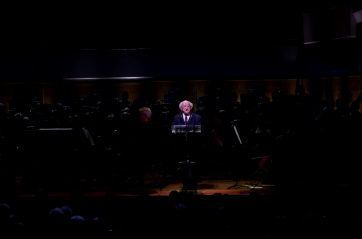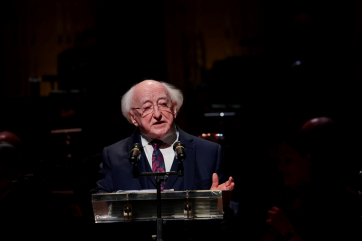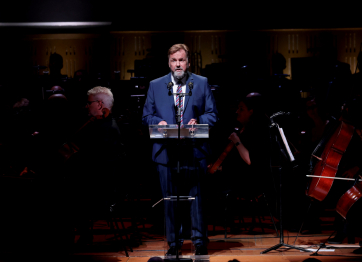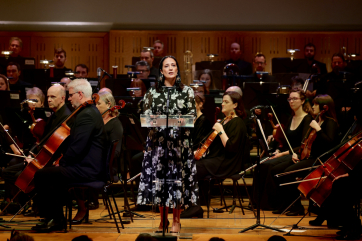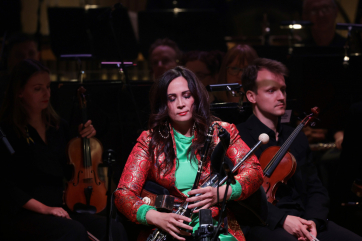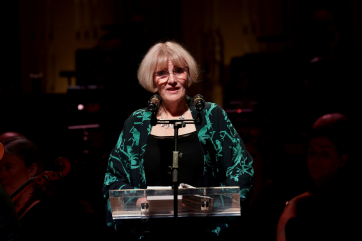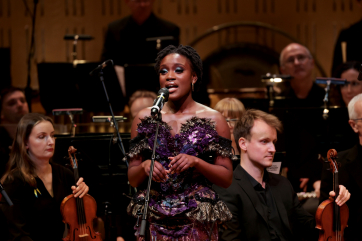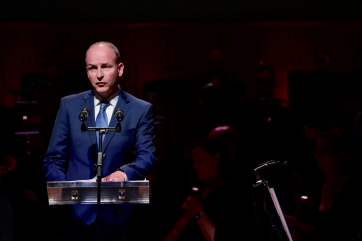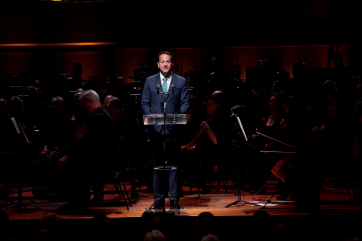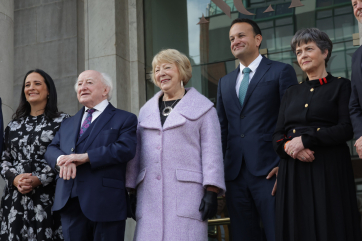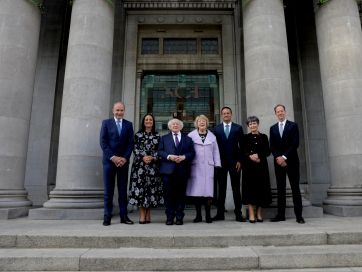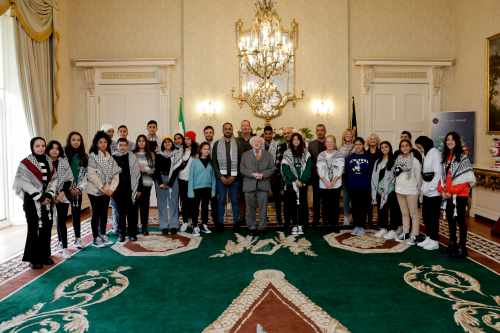Speech at the National Ploughing Championships & World Ploughing Contest
Ratheniska, Co. Laois, 20th September, 2022
A cháirde,
Ar an gcéad dul síos, is mian liom a rá go bhfuil áthas an domhain orm a bheith anseo i Rath an Uisce, Contae Laoise, do Chomórtas Náisiúnta Treabhdóireachta 2022, an chéad ócáid iomlán den ‘Treabhdóireacht’ i dtrí bliana de bharr shrianta na paindéime Covid-19. Is iontach an rud é go bhfuil muid ar ais I gcomhluadar phobal an chéachta.
[May I say how delighted I am to be here today in Ratheniska, County Laois, for the National Ploughing Championships 2022, the first full event of the ‘Ploughing’ in three years following the Covid-19 pandemic restrictions. It’s fantastic that we are back with the community of the Plough].
‘The Ploughing’, as it is known, draws an attendance of almost 300,000 people, making it one of Europe’s largest outdoor events. It has achieved a reputation as a key cultural occasion highlighting all that is great about Irish food, farming and rural culture. It is good to be able, in 2022, to see the returning exhibitors and to welcome those new exhibitors.
2022 is a particularly exciting year, as Ireland hosts the 67th World Ploughing Contest. This year we welcome ploughing teams and their supporters from 24 countries all over the world.
It will be a true masterclass in ploughing that will be on display with the most skilled international competitors battling it out throughout the event.
May I, as President of Ireland, welcome all the participants who have travelled from abroad, and hope that you enjoy your visit to Ireland, for however long you plan to stay.
While the central purpose of the ‘Ploughing’ from its inception is a contest pitting the skills of international ploughmen and women against each other, the ‘Ploughing’ has evolved to being an important trade show, with livestock and machinery exhibitions, trade stalls, craft stalls, vintage motors and even fashion shows, home entertainment, interior design and art exhibitions – a large and diverse event that represents the diversity of modern rural Ireland.
May I pay tribute to all of the National Ploughing Association’s organising team, and in particular its Managing Director of almost five decades, Anna May McHugh. Her track record of unwavering commitment to the ‘Ploughing’, her boundless enthusiasm and unfaltering professionalism has played a huge part in Ireland’s securing of the host location for the World Ploughing Contest.
Anuas air sin, is mian liom buíochas áirithe a ghabháil ar ár n-óstaigh fhialmhara anseo i Rath an Uisce, agus ar na feirmeoirí a chuir an-chuid talaimh ar fáil do threabhadh, thaispeántais, agus pháirceáil, agus leis an nGardaí Síochána, Cómhairle Contae Laoise, agus na céadta oibrithe deonacha a tháinig ó fud fad na tíre chun róil mar bhreithimh, mhaoir, agus fheitheoirí a ghlacadh, agus na clubanna agus na heagraíochtaí a tháinig le chéile chun féile spraoiúil, spreagúil a chruthú as an gComórtas Náisiúnta Treabhdóireachta.
[‘The Ploughing’ is made possible by the co-operation of a number of people and groups, and their generosity. The people of Ratheniska, the neighbouring farmers who have made many acres of farmland available for ploughing, exhibitions and parking, as well as An Garda Síochána, Laois County Council, the hundreds of volunteers from across the country who have travelled here to contribute as judges, supervisors and stewards, and all the clubs and organisations who have joined together to make the National Ploughing Championships such a joyful and inspiring festival.]
Over the course of the next three days we shall all have the opportunity to take part in a celebration of Irish rural life in the fullest sense – of what it means to be working with the land, connecting with nature, raising livestock, viewing innovations that may help achieve goals, both ecological and economic. It is so important for our farming communities, the custodians of our land and our natural environment, and for the vitality of the horticultural culture that the State, and us all, be co-operating partners in achieving an assured future.
Farming is a fundamental human activity, providing societies with food, clothing, medicine and other essential products, as well as being, through best practices, central to maintaining vital ecosystems and supporting biodiversity, soil formation, water regulation and carbon sequestration.
The Census of Farming (2020) carried out by Central Statistics Office informs us that there are 135,000 farms in Ireland, almost all of which are family farms, with over 278,000 people working on farms. More than half (53 percent) of farm-holders stated that farming was their sole occupation.
The number of family farms has remained relatively stable over the past decades, despite the challenges they have faced. I am pleased that the trend for female farmers is on the rise – approximately 18,100 farms (13 percent of the total) are now headed by a woman.
On a sad note, once again at the ‘Ploughing’, may I take the opportunity to extend my deepest sympathies to those of you who may be grieving loved ones who have so tragically lost their lives or suffered serious injuries on farms across the country.
Honouring those who have tragically died is best achieved surely by supporting all those who work to ensure that our farms and fields are not only places of nurture and growth, but also safe workplaces for farming communities.
Farming and the family farm in particular is at the very core of rural life. Staying with good, sustainable farming, drawing on both old wisdom and new methods is how it has survived. It is how it will continue to survive. It is a way of life which has often been passed from generation to generation, one that must be understood and protected from unfair practices in terms of price or inputs.
Nobody knows more than farmers the impacts of unpredictable seasons, of drought, of season creep, of violent storms – in short, of climate change and biodiversity loss. Nobody knows better than those working on the land alongside the hedgerows, placing their hands in the earth, that we are losing species – flora and fauna – at an alarming rate. Those who live in rural Ireland are key players in the urgent task of changing practices and achieving our goals of survival and sustainability.
We are not doing well in our care for our shared vulnerable planet.
It is so important that we all come together to work together to tackle climate change, our greatest existential crisis, and share our efforts in a respectful way rather than in an adversarial manner. Achieving our Sustainable Development Goals is an all-of-society, inter-generational project of urgency.
Food sufficiency is rightly back on the global agenda. We are on course for a planetary population of 10 billion people by 2050, according to United Nations’ figures. Fellow global citizens will need to be fed, and in a manner that does not threaten the ecological boundaries of the planet itself.
The appropriate – that is to say, ethical and sustainable – use of science and technology will be critical to achieving this outcome, of sustainable food production for a planet of 10 billion global citizens of varying needs and circumstances.
Failing to achieve security from the threat of famine and malnutrition is one of the great global failures of our time. We are once again threatened with famine, sourced in the worst drought in 40 years.
Climate, animal loss and the scientific resources of the world are directed towards a new race of missile production and the depletion of resources – human and scientific – into war efforts, while millions of people are facing life-threatening hunger as famine sweeps across the Horn of Africa in what is and was a predictable, and preventable, emergency in so many respects.
At least 19.4 million people have been affected by the severe drought centred on Ethiopia, Northern Kenya, Somalia and Djibouti, with almost 2 million children on the verge of death, suffering from severe acute malnutrition.
The Horn of Africa has suffered from four failed rainy seasons in the past two years, resulting in widespread crop failure and drought. With the native crop destroyed and spiralling fuel and food prices, people in the region can no longer afford basic foodstuffs for survival.
Almost half of Somalians face acute food insecurity. Currently 1.5 million Somalian children under five are facing acute malnutrition, and an estimated 4.2 million people are facing acute water shortages. In addition, over 3 million livestock have died.
Russia’s illegal invasion of Ukraine has exacerbated the threat to the lives of families in the region, with many supply lines of crops being blocked. Wheat is a significant staple in most countries and is critical to the achievement of a nutritious diet in many developing nations. At the outbreak of war, Ukrainian and Russian wheat accounted for 90 percent of wheat imports in East Africa.
While responding to humanitarian needs, it is also of the greatest importance that the underlying failures disrupting global food supply are addressed, including speculation in food as a commodity.
The global response cannot be to continue to neglect the structural sources of food insecurity.
Ongoing issues of sustainable food production will be accompanied by human needs of availability, affordability, food utilisation and nutrition. Consumers too are now increasingly demanding assurances of safety, nutritional value and sustainable production methods for the food they consume, as well as greater choice and convenience in food products.
Increasing food production in an appropriate way for our growing world population will require increases in productivity and yields, but such increases must be sustainable, even as we continue to lose land to environmental degradation and climate change. This means producing a range of staples high in nutrition, proximate to where they are needed, thereby avoiding long, hazardous transport routes and supplier monopolies.
Sustainable farming will entail ongoing changes to some of our farming practices, based on science and technology, of more widespread participation in environmental schemes, such as the Burren Programme, an excellent example of how we can work together to overcome challenges.
Knowledge and information-sharing will be key to addressing the major challenges we all face. I know that some of you are collaborating on innovative ways to address these challenges through different European Innovation Partnership programmes.
Farming and food production has to be respected. May I repeat concerns I expressed at ‘Bloom’ as to at the vulnerability of primary producers in the face of a retailing environment that is increasingly concentrated and dominated by a small number who exercise unfair practices which exploit the vulnerability of producers, and distort the relationship between producer and consumer, making sustainability difficult to be achieved. This is a bad, immoral agri-business model.
While the CSO informs us that there were 17,842 tillage or mixed-crop farms in 2020, there are now fewer than 100 commercial providers of vegetables left in the country, compared to about 350 in 2010. The falling price of fresh produce from the horticulture sector, in particular, has resulted in squeezed margins for primary food producers, and the current high-inflation environment unfairly puts yet more pressure on farmers to produce more for less. It now poses a significant threat to the viability of primary food production in Ireland.
We must put an end to the destructive practice of below-cost retail. Consumers, and it is hard in these times, must be willing to support those who are producing our food in the most sustainable conditions.
Such practices are destroying the horticulture sector and other sectors dependent on the domestic retail market. Such practices are simply unsustainable, and I continue to support farmers in their calls for fair prices for their produce.
Of course, farming is more than the calculation of profit margins on the agri-food products that result as its outputs. Farming is the heart of Ireland. Farming communities make Irish rural life possible, through good and bad times.
May I say, mar Uachtarán na hÉireann, that rural communities, again and again, in responding to the devastation and havoc wreaked by destructive storms, have demonstrated a remarkable spirit of resilience and solidarity, checking on livestock and on their neighbours. Rural Ireland and those who assisted in these increasingly frequent and severe weather events showed the best side of Irishness.
They continue to do so, opening their hearts to the thousands of Ukrainian people who have arrived in Ireland.
The influx of new faces into rural Ireland, as well as a source of great cultural exchange, is helping with the process of rural regeneration nationwide. It is so heartening to see many old buildings being re-purposed in towns and villages, some coming back to residential use again. This is sustainable living in action.
The pandemic has encouraged many to return to rural Ireland, and many more to leave urban centres in favour of a perceived higher quality of life. This has the potential to benefit both rural and urban communities if managed well.
However, the ongoing retrenchment of commercial and interactive services from rural Ireland – be they banks, post offices, or other key services – is utterly regressive and short-sighted if we wish to see balanced regional development and rural regeneration continue.
Credit unions continue to play a central role in rural communities. May I pay tribute to all those who volunteer in the sector, a sector which continues to provide equitable financial services for members using a cooperative model which benefits the whole of society.
We all have to accept that retaining rural communities will require investment by the central and local state, as well as private investment, in terms of income, services and infrastructure. This investment is required in order to guarantee and enable the participation of rural citizens in society, to ensure we have a Republic in which there is an equality of citizenship and participation.
The changes we all need to make to our lives and livelihoods in the coming years in order to play our part in the climate change crisis, honouring our international commitments, will need to be undertaken within the framework of a ‘Just Transition’.
This means protecting the rights and livelihoods of those impacted when economies are shifting to sustainable production, including farmers whose lands and businesses are particularly vulnerable to the impacts of climate change.
May I conclude by asking us all to acknowledge the invaluable contribution of agriculture to Irish society as a whole, in particular to rural Ireland, and of the foolishness of setting rural and urban ambitions in tension with each other. The enormous task of tackling the climate and biodiversity emergency, and of making our nation more environmentally sustainable, is a task that belongs to us all and must be undertaken by us all working together.
The role of farmers, their families, and those employed in the farming sector is critical in this endeavour, and I thank you all for your continued efforts in this regard and those you are being asked to make in the coming years, the flexibility and openness you demonstrate, as we make a just transition to a sustainable economy and society.
It is as people rooted like rocks in the soil, earthed, courageous, generous, compassionate and inclusive, displaying solidarity, not only with our fellow countrymen, our nearest neighbours, but with all people, wherever they may be, that we can overcome any difficulty and surmount any obstacle together.
Our farming communities, our farming families, have demonstrated the truth of this time and again throughout our history, and I know they will continue to do so in the future with the support of all the citizens of Ireland.
We must all be together demonstrating the special solidarity that is required for sustainability to happen. We can, and we will, together, meet the challenges of the future – addressing hunger, global food insecurity, climate change and biodiversity loss, managing Brexit, feeding the planet’s expanding population, protecting our farm families and rural communities, and continuing to build an inclusive, flourishing, compassionate and generous Republic.
Tá súil agam go mbainfidh sibh ar fad sult as Treabhdóireacht 2022, agus guím gach rath ar an ócáid.
[I hope you all enjoy Ploughing 2022 and the World Championships, and I wish the event every success.]
Beir beannacht.

